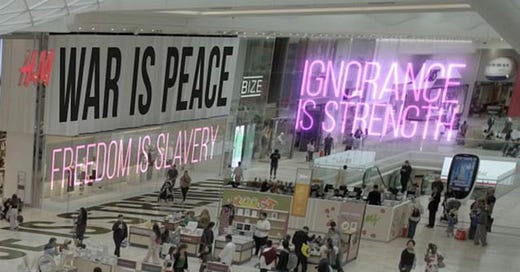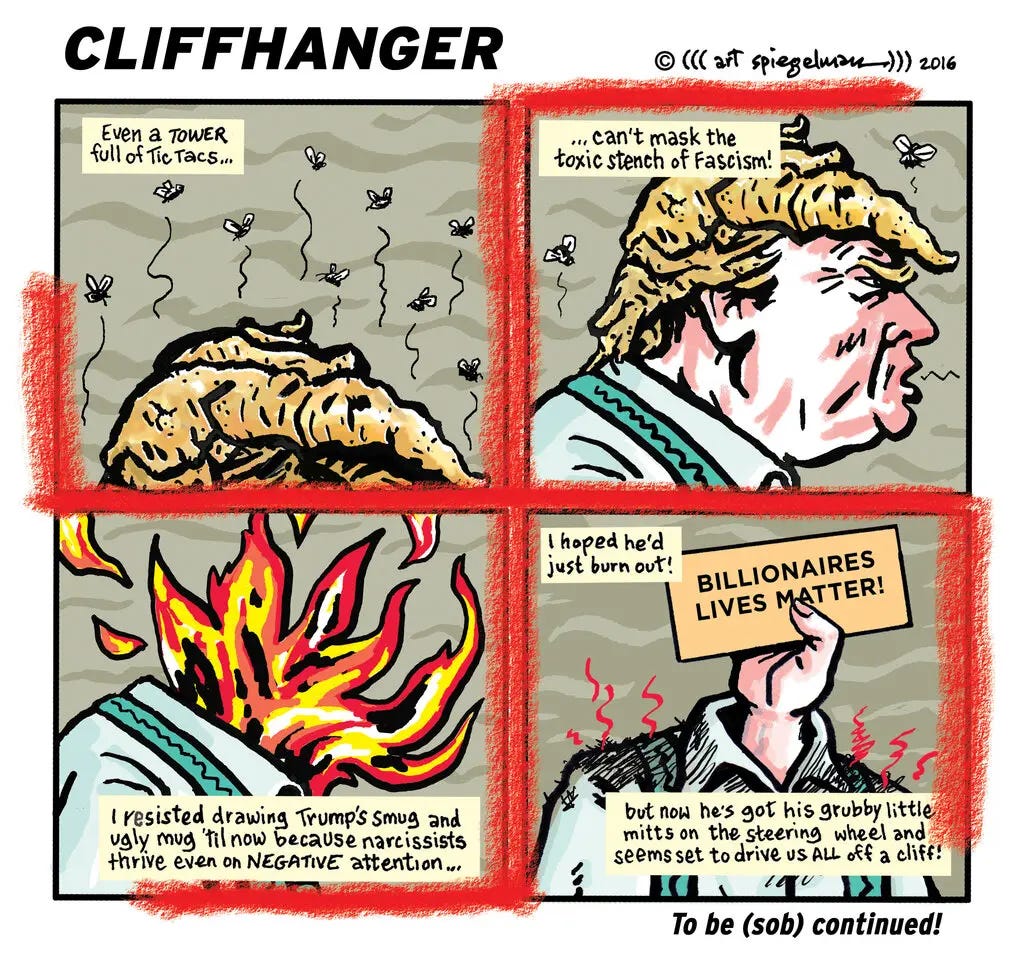How Bad Will Film and Media Censorship Get in Trump's America?
As Hungary Goes, So Goes the Nation
As I wrote in Documentary magazine this week, the situation at PBS these days is pretty dicey (See “C” is for Censorship). Filmmakers spoke of a prevailing culture of fear, obfuscation, confusion, and a general lack of transparency and accountability—and on top of all of that, there were at least two instances of films being overtly censored. As reported, top executives at PBS cut an anti-Trump sequence from Art Spiegelman: Disaster is My Muse—yes, that Art Spiegelman, the cartoonist famous for his Pulitzer Prize-winning graphic novel Maus and anti-fascist life’s work. As producer Alicia Sams told me, “The irony of censoring someone who is a free speech advocate is maybe lost on PBS, but certainly not lost on us.”
But read the news a little bit these days, and it’s clear these cases are actually only the beginning. Compared to Trump’s model autocracy Hungary, and the plans of the extreme right-wing in power in the U.S., it seems like it’s only a matter of time before all media and education is fully controlled by the State.
In Hungary this week, conservative lawmakers, just like those in the U.S., are pushing forward to pass a bill that would restrict independent media and muzzle voices of dissent. It’s called “On the Transparency of Public Life,” and its true Orwellian thought-police intentions are masked by its stated goals to shield the country from so-called “foreign influence.”
According to a statement by the Hungarian Documentary Association, the bill will “endanger the work and livelihoods of Hungarian documentary filmmakers who rely on international funding to tell stories that challenge the government’s narrative or focus on issues deemed controversial or ‘anti-Hungarian,’ such as marginalized communities or dissenting viewpoints.” According to several European groups, the law’s vague language is written in such a way that it gives the government broad leeway to define what these foreign-supported organizations are, leaving “wide room for political misuse, threatening a broad swathe of civil society — including independent media, watchdog organizations, and ordinary citizens engaged in public life,” according to Transparency International.
Sound familiar? Many Hungarian politicians have actually cited the Trump Administration’s actions as inspiration for the law (as opposed to Putin’s Russia), suggesting that if the great U.S. democracy can do it, so can we!
And we are. Hidden in the Republicans’ current budget reconciliation “megabill” is Section 112209, resurrecting language from the Stop Terror-Financing and Tax Penalties on American Hostages Act (a.k.a. the “Non-Profit Killer”), which grants the government the ability to designate any U.S. nonprofit a “terrorist supporting organization” and to strip it of its tax-exempt status. (Urge your Senators to remove it.)
Like the law in Hungary, the U.S. legislation does not require any evidence to support the government’s claims, and the ability to successfully appeal their decision rests solely with the government. In this way, the Trump Administration can label any nonprofits—media outlets, film organizations, educational institutions—as Hamas-supporting terrorists on the flimsiest of claims and try to destroy them. As we’ve seen, it can only take an Op-Ed (or simply be Harvard) to be accused of baseless claims of “pro-terrorist conduct.”
When writing the article about censorship at PBS, I was worried about writing something critical of PBS at a time when its status is so precarious. Should we really be attacking PBS when we should all be rallying around it? But I just don’t see it surviving the country’s authoritarian turn. Conservative lawmakers and Republican states, once seen as caring of their local communities and the value of the public square, have shown no interest in protecting free speech and local news (not to mention healthcare, clean air, preventing poverty, et. al.). If Hungary is the goal (see the European Council on Foreign Relations’ report “The Orbanisation of America: Hungary’s lessons for Donald Trump”), public media doesn’t have a chance. Or if it does, it might resemble Fox News.
Just look at the fate of Voice of America, once seen as a bastion of American democracy around the world, and will now be licensing and broadcasting content from the far-right One America News Network. As former VOA journalists Patsy Widakuswara and Jessica Jerreat told CNN, “Congress mandated VOA to report reliable and authoritative news, not to outsource its journalism to outlets aligned with the president’s agenda.” But the Republican-controlled Congress is now fully aligned with the autocratic executive branch, so there’s not a single whiff of interest in democracy, truth, journalism, or community, but rather junk conspiracy-laden news like OAN’s recent bombshell: “Joe Biden’s alleged auto-pen scandal could be bigger than Watergate”!
The entire so-called “liberal” entertainment sector is also now in the crosshairs of FCC Chairman Brendan Carr, who has proudly declared himself an enemy of anything that isn’t right-wing, “pushing back on the overreach that comes from Hollywood and New York programming that ABC, CBS and NBC are pushing,” Carr told Politico.
Like the double-speak coming out of Washington, Carr equates anything that doesn’t align with Trump’s agenda as going against the “public interest.” On social media, he attacked Comcast/NBCUniversal/NBC, stating, “News distortion doesn’t cut it.” And in the same social media post he reiterated the Administration’s disinformation—incorrectly calling wrongly deported man Kilmar Abrego Garcia “a member of the violent MS13 gang.” When the FCC Chief is flagrantly repeating lies and distortions as fact, we are way beyond the realm of federal regulatory behavior and into the land of Orwell.
Speaking of Orwell, Raoul Peck’s by all accounts stunning new film “Orwell: 2+2=5” couldn’t come to theaters fast enough from indie studio NEON—and marks one of the few remaining projects backed by Participant (R.I.P.)—but what happens to the film when it goes to Hulu, a division of Disney. Carr’s FCC has already launched an investigation into Disney, and a capitulating Disney already dumped its diversity, equity, and inclusion programs and websites. Recently, Disney’s top brass even reportedly told the hosts of “The View” to tone down their anti-Trump rhetoric. What’s next?
Political films critical of Trump or autocracies may be free to play in theaters, but Carr and the Trump Administration have shown they will pull all the levers of power at their disposal to keep broadcasters and corporations in line—and that includes the streaming platforms that all films rely on for revenues and audiences—so who is to say they won’t face the same kind of pressure campaigns in terms of their content. No film studio—and certainly not Disney or Paramount—has shown they have the wherewithal to stand up against them.
So what do we do? When I spoke to filmmaker Marjan Safinia for Documentary, she admitted to me, “It's almost inevitable that the fight will be lost, but I would like the historical record to show that a bunch of people who care about this shit went down fighting, as opposed to they just kind of rolled over and ignored it.”
But even more than that, Safinia suggested there’s another very crucial fight that needs to be had, which I think may be more winnable: What happens to the films that have already been made and are already in circulation somewhere? Going back to Orwell, I’m reminded of the refrain from 1984: "Who controls the past controls the future; who controls the present controls the past.”
As Safinia told me, “Look at the archive, right? In many ways, PBS programming has been an archive of the story of black and brown people in this country, so there's another layer of this, which is the repository of history. How do we protect that?”
Indeed, if the Trump Administration is going to shut down freedom of expression and try to rewrite the past and the present in the next two to four years, creators should be able to preserve their work, whether that’s buying back the rights to film that are in limbo for cheaper fees (let’s get a philanthropic fund started for that!) or ensuring there is a place somewhere, even one that provides no revenue in the far corners of the web, where this work can still exist for now.
Safinia reminded me that the Shah of Iran once had one of the largest collections of modern art in the world. After the Islamic Revolution in 1979, it was tucked away, now primarily stored in the vaults of the Tehran Museum of Contemporary Art. Some 46 years later, they’re still hidden there. Let’s hope we don’t have to wait quite that long.






I must have missed it. What actual censorship has taken place?
Because only recently we dismantled a very real and widespread censorship industrial complex under CISA, The Atlantic Council, the Stanford Internet Observatory, people like Elvis Chang at the FBI, NewsGuard and others. We should certainly remain vigilant.
as an American filmmaker living in Paris and watching developments - it all feels so surrealistically real